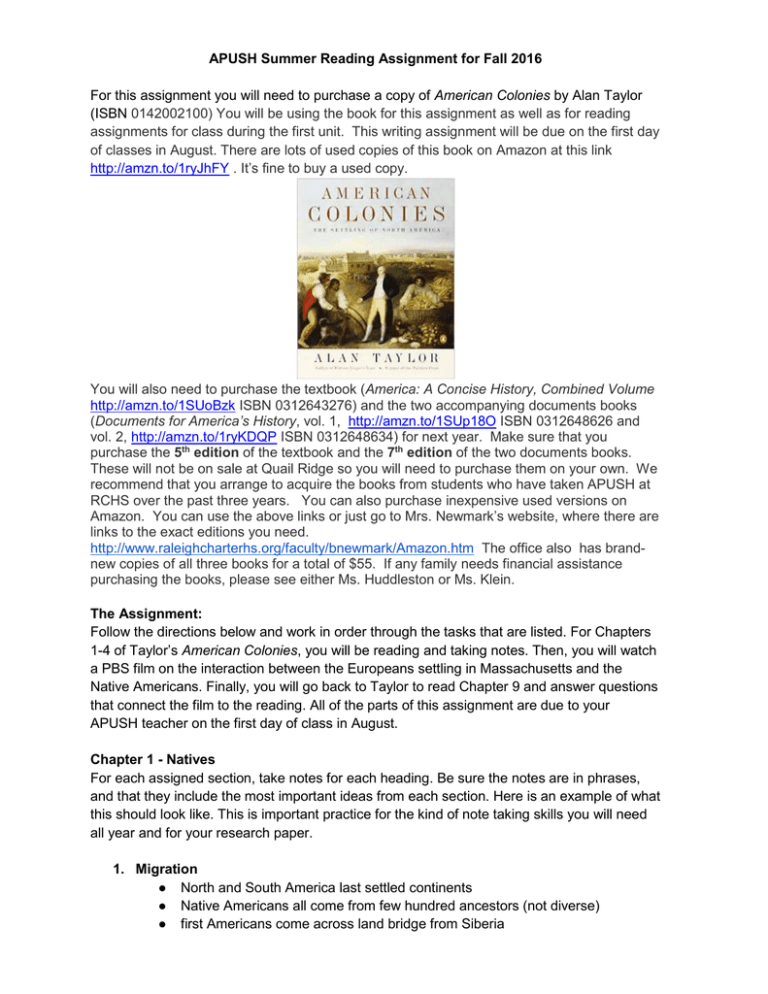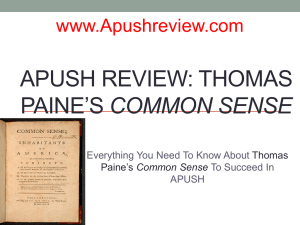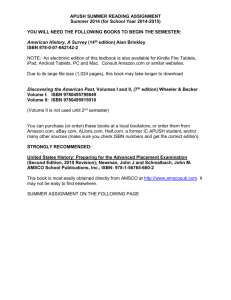APUSH Summer Reading Assignment for Fall 2016 American Colonies (ISBN
advertisement

APUSH Summer Reading Assignment for Fall 2016 For this assignment you will need to purchase a copy of American Colonies by Alan Taylor (ISBN 0142002100) You will be using the book for this assignment as well as for reading assignments for class during the first unit. This writing assignment will be due on the first day of classes in August. There are lots of used copies of this book on Amazon at this link http://amzn.to/1ryJhFY . It’s fine to buy a used copy. You will also need to purchase the textbook (America: A Concise History, Combined Volume http://amzn.to/1SUoBzk ISBN 0312643276) and the two accompanying documents books (Documents for America’s History, vol. 1, http://amzn.to/1SUp18O ISBN 0312648626 and vol. 2, http://amzn.to/1ryKDQP ISBN 0312648634) for next year. Make sure that you purchase the 5th edition of the textbook and the 7th edition of the two documents books. These will not be on sale at Quail Ridge so you will need to purchase them on your own. We recommend that you arrange to acquire the books from students who have taken APUSH at RCHS over the past three years. You can also purchase inexpensive used versions on Amazon. You can use the above links or just go to Mrs. Newmark’s website, where there are links to the exact editions you need. http://www.raleighcharterhs.org/faculty/bnewmark/Amazon.htm The office also has brandnew copies of all three books for a total of $55. If any family needs financial assistance purchasing the books, please see either Ms. Huddleston or Ms. Klein. The Assignment: Follow the directions below and work in order through the tasks that are listed. For Chapters 1-4 of Taylor’s American Colonies, you will be reading and taking notes. Then, you will watch a PBS film on the interaction between the Europeans settling in Massachusetts and the Native Americans. Finally, you will go back to Taylor to read Chapter 9 and answer questions that connect the film to the reading. All of the parts of this assignment are due to your APUSH teacher on the first day of class in August. Chapter 1 - Natives For each assigned section, take notes for each heading. Be sure the notes are in phrases, and that they include the most important ideas from each section. Here is an example of what this should look like. This is important practice for the kind of note taking skills you will need all year and for your research paper. 1. Migration ● North and South America last settled continents ● Native Americans all come from few hundred ancestors (not diverse) ● first Americans come across land bridge from Siberia ● 2. 3. 4. 5. 6. people worked their way south Paleo and Archaic America Horticulture Hohokam and Anasazi Mound Builders Beliefs Chapter 2- Colonizers For each assigned section, take notes for each heading. Be sure the notes are in phrases, not full sentences and that they include the most important ideas from each section. In Chapter 2, you may skip pages 28-32 (The Atlantic) 1. 2. 3. 4. 5. Europe Columbus Epidemics Food Ecological Imperialism Chapter 3 - New Spain You may, of course, read the whole chapter, but focus on the introduction on p. 51 - 52 and p. 57 - 62. For each assigned section, take notes for each heading in the same bullet-point format you have already been doing. 1. 2. 3. 4. Introduction (p. 51) Conquistadores Consolidation Colonists Chapter 4 - The Spanish Frontier A. Read the sections on p. 70 - 79 and take notes for each section on the interactions between the Spanish and the Native American tribes they encounter. Keep the same bulletpoint format you’ve been using. 1. Soto and the Mississippians 2. Coronado and the Pueblo 3. Florida and the Native American tribes there B. Read p. 79 - 90 and answer the following questions on those sections. 1. From the late 16th into the 17th century, assess the impact of Spanish rule over the region of New Mexico. How did the approach and goals of the administration change in this period? 2. Assess the role of the Franciscan missions in New Mexico. How successful were they and what was their impact on relations with the Pueblo? 3. What were the causes and consequences of the Pueblo Revolt? Watch the first episode of the PBS series on Native American History, We Shall Remain. The episode entitled “We Shall Remain: After the Mayflower” can be viewed online at youtube in nine separate sections. http://tinyurl.com/m79v94g (or it can be viewed through Amazon Prime or Netflix). The episode is approximately ninety minutes long. 1. Explain in a paragraph the ways in which the relationship between the Wampanoag and the colonists changes from the beginnings of English contact in 1620 through the 1670s. 2. Why do you think the relationship between the Wampanoag tribes and the New England colonists changes in these ways? Read Chapter 9, Puritans and Indians, 1600-1700. For each response, include the page number from which you are drawing information. 3. What is an example of an assertion of Taylor's that concurs with an idea presented in the video? Explain how that idea is presented similarly in the two sources. 4. What is an example of an idea of Taylor's that disagrees with or is presented with a different perspective than how it is presented in the video. Explain how that idea is presented differently in the two sources. 5. How did the New England colonists justify the taking of Indian land? 6. Draw a schematic diagram or map to display the system of economic exchange described on page 194 that developed in New England. 7. Throughout American history, disparate groups of Native Americans have periodically attempted to join together in their efforts to resist settlement and pressures by Europeans. Rarely have these “Pan-Indian” efforts had success. What are two examples of failures of Pan-Indian efforts or examples of conflict among Native Americans that hindered resistance to the colonists in New England?




